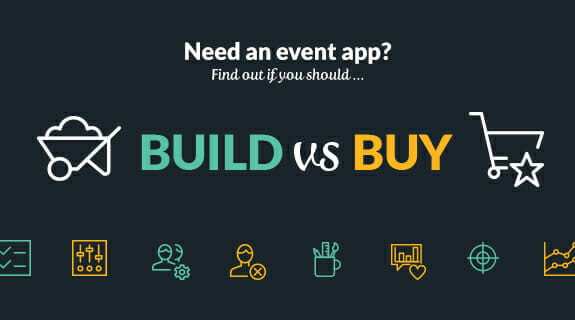Building vs. Buying an Event App
Nowadays, it’s become second nature for people to use mobile apps when accessing information and conducting daily life activities (e.g. online banking, purchasing groceries, watching movies, etc.). For event planners, this channel is an easy and convenient way to engage an attendee because access to their attention is literally in their hands.
Apps account for over 80% of time spent on mobile (Global Digital Future in Focus, ComScore 2018). Given that most of people’s time on their phone is already spent on mobile apps, they would have the intuition of picking up on how to use an app and using it to their benefit, like accessing event content and schedules. So it makes sense that more and more event planners are deciding to invest in an event app. The big question is – should you build the app yourself or partner with an expert vendor?
Making the Decision
Consider building an event app if your situation looks like this:
Event App Goals: The goals you’re trying to achieve with an event app are simple — basic things like showcasing the agenda, sponsor profiles, and onsite communication through push notifications.
Technical Resources: You have an in-house team of developers who are able to dedicate enough time and resources to develop your event app. You also have about 400 hours available in your
Event Workback Schedule (including developer training, testing, and time to promote the app
before the event).
Event App Design: Your in-house development team has the necessary UX/UI design skills and experience to ensure that your event app is attractive and easy-to-use for attendee.
Development & Testing: You are able to assign a Project Manager and Quality Assurance Manager who can oversee the development and testing of the event app, hold developers accountable to timelines and scope requirements, and be responsive to your team’s feedback/adhoc requests or changes.
Pre-Event Promotion: You will have enough time to design marketing material and adequately promote the event app to attendees through your own communication channels leading up to the live event.
Onsite Event App Management: On the day of the event, you have a team member/developer who will own making last minute updates to the event app and/or address technical difficulties. You also have staff members who will own being expert users of the event app, and provide training to attendees on how to download and use it.
Event Analytics: Based on your event goals, you only need to measure a specific area of data to evaluate your success. For example, if your main event goal is to evaluate the registration, you only need access to registration analytics.
Costs: You are able to invest $20K to $140K for building custom software, plus room for any unexpected costs and resource requirements.
Consider buying an event app if your situation looks like this:
Event App Goals: The event app is closely connected to achieving your larger, overall event goals. You need more advanced functionality and integration to increase event revenue, attendee engagement, and networking
Technical Resources: Technical resources, sufficient amount of dedicated time, and/or technical of expertise are not available in-house to develop and troubleshoot the creation of an event app. You need an event app that can be built quickly, tested, and has a team dedicated to ensuring it
operates seamlessly.
Event App Design: You prefer leveraging the expertise of an event app provider who can develop a customized event app design, based on the best practices and successes of previous clients.
Development & Testing: You prefer having an expert consultant who can oversee the development of your event app, predict and communicate any potential issues and solutions, and requires the minimum amount of your time investment.
Pre-Event Promotion: Creating and executing pre-event promotional materials will be a challenge, so leveraging the marketing support and best practices of an event app provider will help increase event app adoption and awareness.
Onsite Event App Management: You prefer having real-time instant access to a customer support team who can respond to and fix your event app problems right away on your behalf. You prefer having onsite support to help with event app adoption and usage so that you can focus on other priority tasks during the live event.
Event Analytics: You need to evaluate event analytics across a variety of areas such as registration, attendee engagement, and sponsorship ROI so having easy, integrated reporting capabilities would
be extremely beneficial.
Cost: The starting costs to set up infrastructure are beyond your budget size and you prefer having
budget certainty. An event app usually costs in the range of $5K-15K.
Recommended: Read this case study of how GetWellNetwork was able to save thousands of dollars by using an event app
Thinking of buying an event app instead of building? Try our sample event app for a first-hand experience on what it’s like to design and use an event app.
